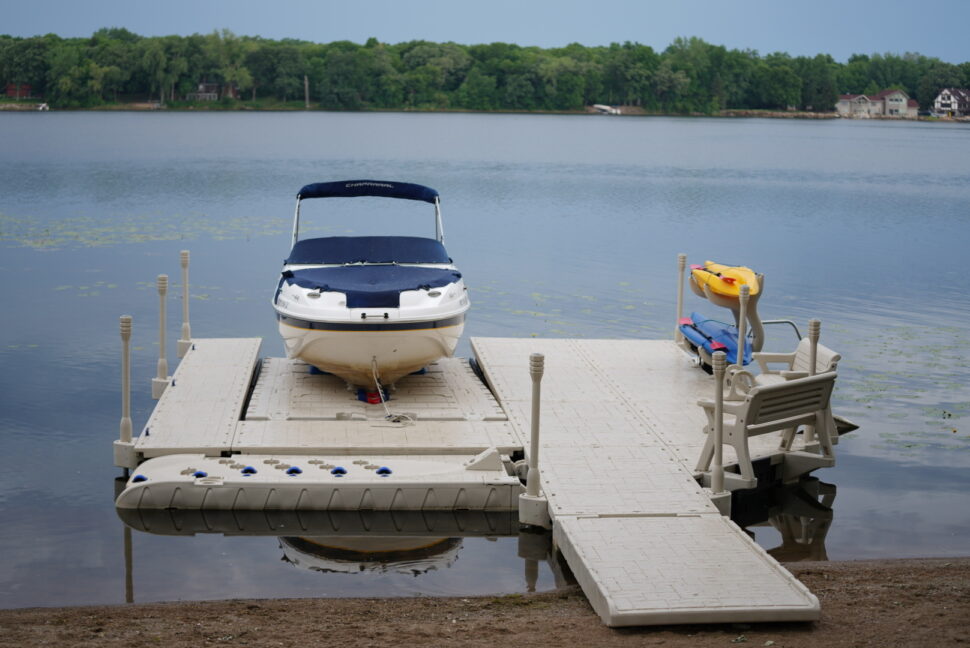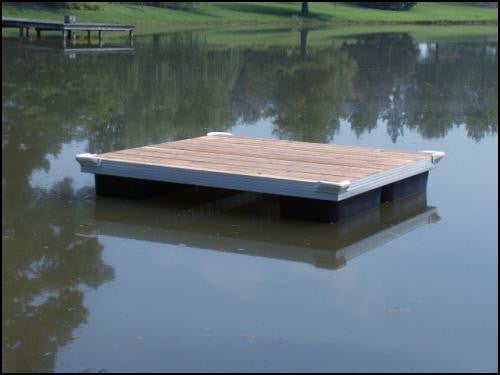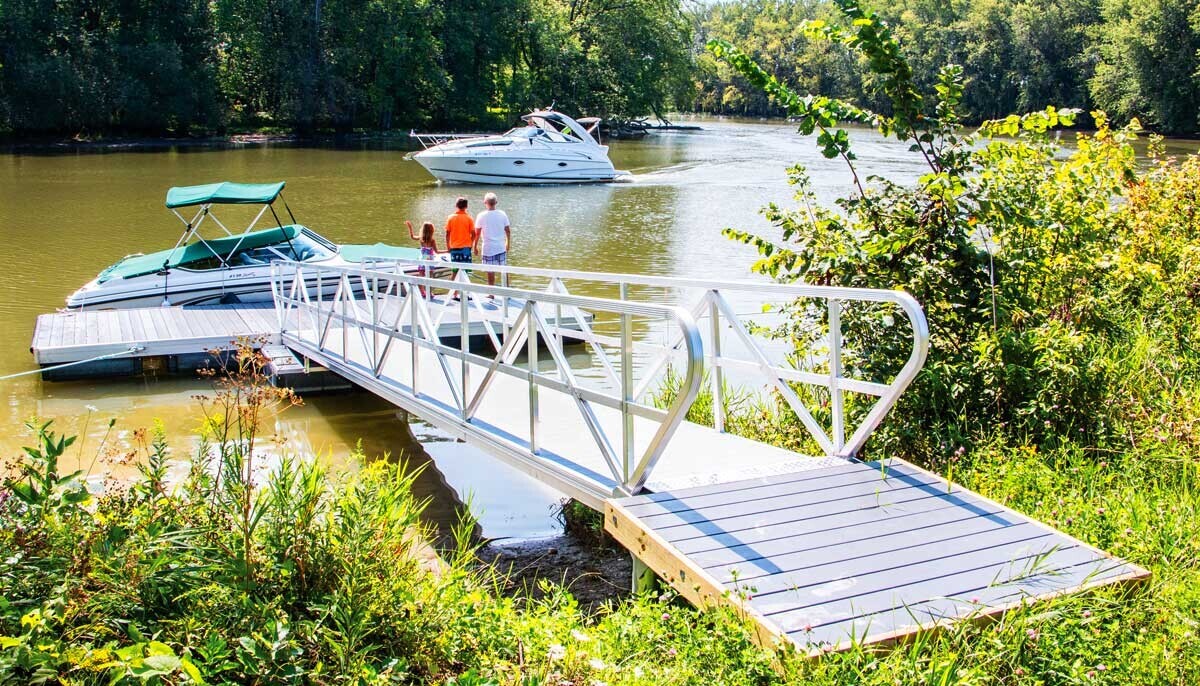The Ultimate Guide to Choosing the Finest Floating Docks
Choosing the ideal floating dock requires an extensive understanding of numerous elements that affect both efficiency and long life. Elements such as dock types, materials, and crucial attributes significantly impact your decision-making process.
Comprehending Floating Dock Kind
When choosing a drifting dock, it is necessary to recognize the various kinds readily available, as each serves unique purposes and applications. Floating docks mostly drop into 3 categories: modular, stationary, and pontoon docks.
Modular docks are composed of specific areas that can be quickly put together or reconfigured, making them suitable for altering water degrees and diverse uses, such as recreational tasks or business operations. Their flexibility allows for customization based upon particular requirements.

Pontoon docks are characterized by their resilient structure, often made up of several pontoons that supply security and assistance. They are specifically fit for bigger vessels and are typically used in marinas or for waterside buildings. Recognizing these kinds help in choosing one of the most ideal floating dock to fulfill particular demands, making sure ideal performance and safety and security.
Key Products for Sturdiness
Choosing the appropriate products for floating docks dramatically influences their resilience and longevity. One of the most typical products include timber, plastic, steel, and composite materials, each offering distinct benefits and restrictions.
Timber, typically favored for its visual allure, needs normal upkeep to withstand moisture and degeneration. Pressure-treated lumber can boost resistance to rot, however it might still be prone to pests and weathering.

Plastic docks, made from high-density polyethylene (HDPE), are immune to rust, UV radiation, and impact, making them a preferred choice for coastal environments. Their lightweight nature also promotes easy installation and relocation.
Metal docks, generally created from aluminum or galvanized steel, provide exceptional toughness and sturdiness. They are resistant to corrosion, specifically when dealt with, however might call for extra insulation to avoid warmth build-up in hot environments.
Composite products, incorporating timber fibers and plastics, deliver the benefits of both wood and plastic, resisting dampness and fading while requiring minimal upkeep. - floating dock company
Inevitably, the selection of materials ought to line up with environmental problems, planned use, and upkeep preferences to ensure the floating dock remains functional and visually pleasing with time.
Necessary Features to Consider
While the selection of products is crucial, considering important features for floating docks is equally important to guarantee optimum performance and user contentment. One key attribute to go to the website examine is the dock's buoyancy capability, which determines exactly how much weight it can support without submerging. floating dock company. This is essential for accommodating watercrafts, individual boat, and also recreational tasks
Additionally, portability is a substantial consideration. Depending upon your demands, you may want a dock that is easy to transfer and dismantle, especially if you prepare to relocate it seasonally. Security is an additional crucial function; a properly designed floating dock should his explanation lessen motion triggered by wind and water currents, offering a secure system for individuals.
Safety attributes, such as non-slip surface areas and rounded edges, are additionally important to prevent crashes, especially in wet conditions. Moreover, consider the accessibility of accessories, such as cleats, bumpers, and ladders, which can boost the functionality of your dock.
Setup and Maintenance Tips
Establishing and keeping a drifting dock requires mindful preparation and interest to information to ensure its long life and optimal efficiency. Begin by choosing a suitable area that minimizes exposure to solid currents and waves, which can create deterioration. Make certain that the water deepness is enough for the dock's height and that it is secured securely to avoid movement.
Throughout installation, adhere to the manufacturer's guidelines very closely, as improper assembly can endanger security. Usage high-quality materials immune to rust, such as light weight aluminum or treated wood, to enhance sturdiness. On a regular basis examine all components, consisting of floats, connectors, and securing systems, for indications of damages or wear.
Upkeep is critical for prolonging the life of your dock. Tidy the surfaces periodically to avoid algae buildup and look for any loose fittings that may require firm. If your dock uses flotation devices, guarantee they stay intact and totally free from leaks. In addition, think about applying safety layers to wood components to lower weathering impacts. By adhering to these installment and upkeep ideas, you can enjoy a useful and trusted floating dock for years ahead.
Budgeting for Your Dock
Budgeting for your dock is a critical step that can dramatically impact your general fulfillment and financial investment in a waterfront home. Developing a clear budget assists you browse the numerous options offered and guarantees you make educated decisions that line up with your monetary capacities.
Begin by determining the size and layout of the dock you require, as these elements will considerably affect the cost. Floating docks can differ significantly in cost, relying on materials, buoyancy, and functions like ramps and accessories. Research different suppliers and providers to compare rates and comprehend the marketplace value.
In addition to preliminary prices, think about continuous costs such as maintenance, insurance coverage, and prospective repair work. Designate funds for these persisting expenses to prevent surprises down the line. It's also sensible to allocate any kind of essential authorizations or examinations, which might be called for by neighborhood regulations.
Last but not least, remember the possible return on financial investment. A tactical dock can boost your residential property's value and charm, supplying a positive financial influence in the lengthy term. By budgeting efficiently, you can guarantee that your dock fulfills your requirements without jeopardizing your financial security.
Final Thought
In final thought, selecting the excellent floating dock necessitates a thorough assessment of various variables, consisting of dock kinds, materials, important features, and installment procedures. Cautious consideration of financial constraints will additionally make certain a sound financial investment.

While the option of products is essential, taking into consideration necessary attributes for floating docks is equally vital to ensure optimal efficiency and individual satisfaction.Setting up and maintaining a floating dock calls for mindful preparation and interest to information to ensure its long life visit our website and optimal efficiency. Floating docks can differ dramatically in cost, depending on products, buoyancy, and attributes like ramps and devices.In verdict, choosing the ideal floating dock demands a comprehensive analysis of various aspects, including dock kinds, products, important features, and installation processes.